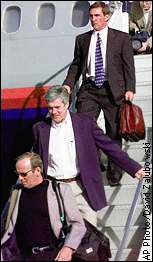 |
| Saturday, March 27 NFL says Y2K bug won't bite By Alex Marvez Scripps Howard News Service |
|||||||||||||||||||||||||||||||||||||||||||||
|
RU ready for the Y2K virus?
The NFL hopes it is. The league has spent more than two years preparing for the damage that might come from computer glitches caused by the turn of the century. In addition to preparing for internal problems, the NFL is determined to play the games scheduled Jan. 2 and 3 in the final week of the regular season. Each team was asked to designate a Y2K liaison to address the situation. The NFL also has told each franchise to check a list of about 100 components essential to staging a game such as stadium services and vending -- and make sure the operations are Y2K-proof. "Right now, our mood is one of cautious optimism," said Jodi Balsam, NFL counsel for operations and litigation. "We're continuing to plod through all the information we're gathering and making contingency plans to prepare for the worst. But what we're told is that the games will be played with very little disruption. "I guess what we want to do is make sure NFL games are produced that day with the same high (television) production values we aspire to for any game and with as little inconvenience as possible to the clubs and fans." But even with complete preparation, Y2K might cause changes. Teams playing road games that weekend were told to prepare for travel Dec. 31, which would be a day earlier than most usually leave (not to mention a nightmare when it comes to booking hotel rooms). Teams will learn what they must do when the 1999 schedule is released in the next few weeks. At one point, the NFL was poised to schedule season-ending games between teams located near each other in case the Y2K bug forced travel via bus instead of airplane. While that idea was dropped because of renewed confidence in air travel, Balsam said there are one or two stadiums that might not be prepared to play host to games because of Y2K-generated problems. The Denver Broncos don't have that problem. In fact, the advanced age of Mile High Stadium is actually beneficial when it comes to the Y2K bug. "Basically, there are very few digital source or date-dependent functions," said Gail Stuckey, the director of stadium operations for the Broncos. "There's so many manual things that are still here. But the big things are the sound systems, the scoreboards, the watering systems and working with the Public Service and telephone companies on what we might be expecting from them." Balsam gave Denver high marks for its Y2K preparedness. Stuckey said the Broncos began working on the Y2K problem in November 1998 and are "about 85 percent there" when it comes to readiness. "That should increase in time," Stuckey said. "No one can answer for Public Service or the telephone company, but we hope both can provide what they normally provide on game day. We should be in great shape." But what will happen if that isn't the case? Balsam said the NFL is preparing for worst-case scenarios. "The worst things will probably be if a stadium simply cannot host a game or if a team does not arrive in time," Balsam said. "Our games have to be played. We're not like baseball. In the worst case, we can play on a high school field the next morning to determine a playoff contender or for whatever reason the game might need to be played. We intend to play every game. "We doubt it will ever come to that. But in a worst-case scenario, some have predicted the Russian nuclear defense system isn't Y2K-compliant. That will give us a lot more to worry about."
AFC West notes New Kansas City Chiefs coach Gunther Cunningham isn't overly impressed with the incoming crop of running backs. "There are a lot of small, explosive backs in the draft," Cunningham said. "But if you look at the (winners of the) last few Super Bowls, they have big, powerful backs and in the end, the quarterback beats you. ... The small guys disappear. We can get the splash player, but in this division you need consistency."
AFC Central notes Baltimore special-teams ace Bennie Thompson was unhappy that some of the Ravens' highest-paid players aren't participating in the team's offseason workout program. Linebacker Ray Lewis, offensive tackle Jonathan Ogden, defensive tackle Tony Siragusa and cornerback Rod Woodson are among the absentees. "The same people who don't attend these workouts are the same ones who run up to the media during the season and complain about how we're losing, and we don't have enough commitment," Thompson said. "I'm tired of losing and tired of hearing excuses. Football is not a six-month job. Football is year-round, and it starts here in the weight room."
AFC East notes
NFC West notes
NFC Central notes
NFC East notes The New York Giants have finally landed a legitimate receiving tight end in Pete Mitchell, who was signed away from Jacksonville with a two-year, $2 million contract. Aaron Pierce led New York's tight ends in 1998 with 10 receptions. Mitchell had 38 in Jacksonville. ... Lawrence Taylor was debating whether to ask New York Jets coach Bill Parcells or Giants owner Wellington Mara to deliver his induction speech into the Hall of Fame. But that was before Taylor's 17-year-old son, T.J., asked for the honor. "It's something I felt I should do," said T.J., who is a junior linebacker at Vance High in Charlotte, N.C. "I wanted it to be a thing of thanks for all he has done for me and my family. I've been thinking about it for a while, ever since Walter Payton's son did the same thing for him."
Four months and counting
Alex Marvez writes for the Denver Rocky Mountain News. |
|
||||||||||||||||||||||||||||||||||||||||||||

